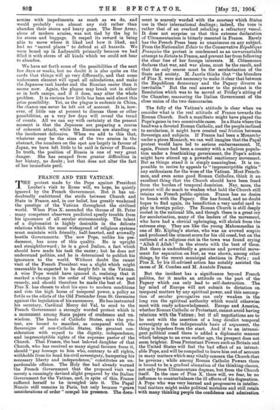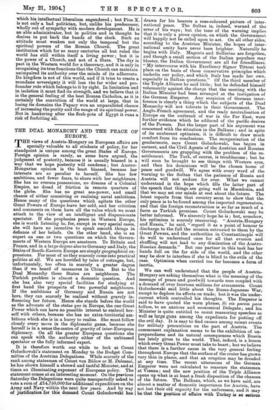T HE protest made by the Pope against President Loubet's visit
to Rome will, we hope, be quietly ignored by the French Government. But it has un- doubtedly embittered the strife between Church and State in France, and, in our belief, has greatly weakened the prestige of the Vatican throughout the civilised world. When Pius X. ascended the throne of St. Peter many competent observers predicted speedy trouble from his ignorance of all secular statesmanship. The talent of a diplomatist is highly desirable in the delicate relations which the most widespread of religious systems must maintain with friendly, half-hearted, and avowedly hostile Governments. The new Pope, unlike his pre- decessor, has none of this quality. He is upright and straightforward ; he is a good Italian, a fact which should have made his task the easier ; but he does not understand politics, and be is determined to publish his ignorance to the world. Without doubt the recent visit of the French President was a slight which might reasonably be expected to be deeply felt in the Vatican. A wise Pope would have ignored it, realising that it marked a change in the order of things which was past remedy, and should therefore be made the best of. But Pius X. has chosen to shut his eyes to modern conditions and ride the high horse of temporal power, a policy as futile as the edicts of the Old Pretender from St. Germ ains against the legislation of his successors. He has instructed his secretary, Cardinal Merry del Val, to send to the French Government a strongly worded protest which is a monument among State papers of crudeness and un- wisdom. The heads of Catholic States, says the pro- test, are bound to manifest, as compared with the Sovereigns of non-Catholic States, the greatest con- sideration with regard to the dignity, independence, and imprescriptible rights of the supreme pastor of the Church. That France, the best beloved daughter of that Church, who has received so many signal favours from it, should "pay homage to him who, contrary to all rights, withholds from its head his civil sovereignty, hampering his necessary liberty and independence," constitutes an un- pardonable offence. The Holy See had already warned the French Government that the proposed visit was merely a cunningly devised slight prepared by the Italian Government for the Vatican, and, in spite of this, France suffered herself to be inveigled into it. The Papal Nuncio still remains in Paris, but only because "grave sonsiderations of order " compel his presence. The docu- ment is scarcely worded with the courtesy which States use in their international dealings ; indeed, the tone is rather that of an overlord rebuking a refractory vassal. It does not surprise us that this extreme declaration of Ultramontanism is bitterly resented in France. Rarely has the French Press been so unanimous on any subject. From the Nationalist Eclair to the Conservative Republique Fran caise the protest is condemned as an unwarrantable attempt to dictate to France, and prevent her from following the clear line of her foreign interests. M. Clemenceau declares that war, and war alone, must be the result, and that the only course must be the secularisation of the State and society. M. Jaures thinks that "the blunders of Pius X. were not necessary to make it clear that between the Republican democracy and the Papacy divorce is inevitable." But the real answer to the protest is the Resolution which was to be moved at Friday's sitting of the Chamber, reassuring the Italian Government of the close union of the two democracies.
The folly of the Vatican's attitude is clear when we consider what is the real attitude of France towards the Roman Church. Such a manifesto might have played the Pope's game in two conceivable cases. In a State where the head was a devoted Roman Catholic, and the people inclined to secularism, it might have created real friction between Sovereign and subjects. If France had been a Monarclay under a pious Monarch, we can well imagine that the Papal protest would have led to serious embarrassment. If, again, France had been a country with a religious popula- tion under a freethinking government, the Pope's action might have stirred up a powerful reactionary movement. But as things stand it is simply meaningless. It is im- possible to revive by appeals to " imprescriptible rights" any enthusiasm for the woes of the Vatican. Most French- men, and even some good Roman Catholics, think it an excellent thing that the Church should have been freed from the burden of temporal dominion. Nay, more, the protest will do much to weaken what hold the Church still retains on French public opinion. France has no desire to break with the Papacy. She has found, and no doubt hopes to find again, its benediction a very useful card to play in foreign policy. The Roman Church is still deeply rooted in the national life, and though there is a great cry for secularisation, many of the leaders of the movement, who have had a clerical upbringing, will shrink from the extreme step. They are like the young Mahommedan in one of Mr. Kipling's stories, who was an avowed sceptic and professed the utmost scorn for his old creed, but on the outbreak of a religious riot in the town was found crying "Allah il Allah ! "in the streets with the best of them. But there is undoubtedly a genuine and powerful move- ment for separation on foot, as was shown, among other things, by the recent municipal elections in Paris ; and Pius X. by his ill-advised action has notably assisted the cause of M. Combos and M. Anatole France.
But the incident has a significance beyond French politics, for it marks an attitude on the part of the Papacy which can only lead to self-destruction. The lay mind of Europe will not submit to dictation on temporal matters by any spiritual power, and this assump- tion of secular prerogative can only weaken in the long run the spiritual authority which would otherwise meet with ready acknowledgment. Europe and America, whether Roman Catholic or Protestant, cannot avoid having relations with the Vatican ; but if all negotiations are to be met with the assertion of a long derelict temporal sovereignty as the indispensable basis of argument, the thing is hopeless from the start. And if to an intransi- gent political creed there is added a diplomatic manner which belongs to an even earlier age, the prospect does not seem brighter. Even Protestant Powers such as Britain and the United States will feel the bad effect of an intract- able Pope, and will be compelled to leave him out of account in many matters which may vitally concern the Church that he governs ; while among Roman Catholic Powers there is bound to be a gradual alienation of the thinking classes, not only from Ultramontane dogmas, but from the Church itself. In the case of Pius X. there will, we fear, be no influence to counterbalance the ill effects of his dogmatism. A Pope who was very learned and progressive in intellec- tual matters might make political mistakes and still retain with many thinking people the confidence and. admiration which his intellectual liberalism engendered ; but Pius X. is not only a bad politician, but, unlike his predecessor, wholly out of sympathy with modern development. He is an able administrator, but in politics and in thought he desires to put back the hands of the clock. Such an attitude must weaken not only the temporal but the spiritual powers of the Roman Church. The great institution which for so many centuries all but ruled the world has still within itself a living power ; but it is the power of a Church, and not of a State. The day is past in the Western world for a theocracy, and it is only in recognising its true functions that the Church can maintain unimpaired its authority over the minds of its adherents. Its kingdom is not of this world, and if it tries to create a mundane sovereignty it will lose the far wider and pro- founder rule which belongs to it by right. In limitation and in isolation it must find its strength, and we believe that it is the general feeling of the best Roman Catholics, as it is certainly the conviction of the world at large, that in losing its domains the Papacy won an unparalleled chance of increasing the purity and the range of its spiritual power. But in hankering after the flesh-pots of Egypt it runs a risk of forfeiting all.



































 Previous page
Previous page